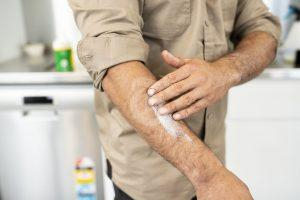Northern Rivers health workers up for awards
By Tim Howard
Staff from Northern NSW Local Health District have been named as finalists for the 2024 NSW Health Awards for their extraordinary efforts to improve the NSW public health system.
Now in its 26th year, the awards acknowledge the personalised, sustainable, and digitally enabled programs that contribute to the wellbeing of patients and the community.
The Rheumatic Heart Disease Project and the Rural Paediatric Complex Care Coordination Project are among 42 finalists from across the state competing for the Excellence in Aboriginal Healthcare Award and Health Innovation Award, respectively.
The Rheumatic Heart Disease Project aims to address the significant public health issue of Acute Rheumatic Fever (ARF) and RHD among Aboriginal communities in Northern NSW.
The project was led by Aboriginal Health Nurse Manager Emma-Jane Davies and supported by Robin Auld, Sally Adams and Daniel Ashton, with valuable advice and advocacy from Aboriginal Medical Service partners, in particular Scott Monaghan from Bulgarr Ngaru Medical Aboriginal Corporation.
The Rural Paediatric Complex Care Coordination Project improves care coordination for regional NSW children, reduces family costs and disruptions, and improves outcomes for families in regional NSW.
This is a joint project with Northern NSW, Murrumbidgee, Southern NSW and Western NSW local health districts, together with the Sydney Children’s Hospitals Network.

Rheumatic Heart Disease Project team members, from left, Tracy Bradshaw (Aboriginal Health Worker, Chronic Care for Aboriginal People), Sasha Harrington (Aboriginal Health Engagement and Governance Manage), Daniel Ashton (Aboriginal Health Performance and Project Analyst), Emma-Jane Davies (Nurse Manager Aboriginal Health) and Kirsty Glanville (executive director Aboriginal Health, NNSWLHD).
Northern NSW Local Health District also partnered with Justice Health, the Forensic Mental Health Network, NSW Health Pathology and NSW Health in the NSW Dried Blood Spot Validation Study that has been named a finalist in the Health Innovation Award.
This project is the first of its kind, and aims to make dried blood spot testing a standard diagnostic tool and, if successful, will change how testing is offered for people at risk of hepatitis C.
NNSWLHD chief executive Tracey Maisey praised the achievements of local finalists who have been recognised for their passion and commitment.
“I am thrilled to congratulate our NNSWLHD staff on having their outstanding contributions to our health system recognised,” Ms Maisey said.
NSW Health secretary Susan Pearce AM said it is really exciting to celebrate the people and teams who are enriching health in millions of ways every day.
“These awards are a chance to recognise our incredible healthcare staff and volunteers, across the public health system,” Ms Pearce said.
“I congratulate the finalists, but I also want to acknowledge the work being done across the system every day, by our teams of doctors, nurses, midwives, allied health and support staff.”
NSW Health received 186 nominations across the 12 award categories.
The finalists and winners will be celebrated at the NSW Health Awards ceremony, which will be held on Thursday, October 24 at the International Convention Centre in Sydney.
It will also be livestreamed from 6pm.





 Tweed Shire News2 years ago
Tweed Shire News2 years ago
 Motoring News2 years ago
Motoring News2 years ago
 COVID-19 Northern Rivers News3 years ago
COVID-19 Northern Rivers News3 years ago
 COVID-19 Northern Rivers News3 years ago
COVID-19 Northern Rivers News3 years ago
 Northern Rivers Local News3 years ago
Northern Rivers Local News3 years ago
 Health News3 years ago
Health News3 years ago
 COVID-19 Northern Rivers News3 years ago
COVID-19 Northern Rivers News3 years ago
 NSW Breaking News3 years ago
NSW Breaking News3 years ago





 A team led by Professor Vipul Bansal, Director of RMIT’s Sir Ian Potter NanoBioSensing Facility, has already developed a prototype sensor that changes colour when exposed to UV radiation that they say could be customised for human-free sunscreen testing by mimicking the skin.
A team led by Professor Vipul Bansal, Director of RMIT’s Sir Ian Potter NanoBioSensing Facility, has already developed a prototype sensor that changes colour when exposed to UV radiation that they say could be customised for human-free sunscreen testing by mimicking the skin. ARPANSA and the Cancer Council Victoria work in partnership to promote sun safety and skin cancer prevention.
ARPANSA and the Cancer Council Victoria work in partnership to promote sun safety and skin cancer prevention.









